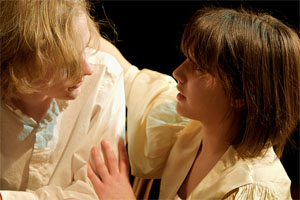|
THE SEAGULL - QUOTING HAMLET In Act I of Chekhov's The Seagull, Arkadina and her son Konstantin quote from Hamlet:
Michael Leader gives a rough, literal translation of these lines as:
These are not the actual lines from Shakespeare, which read:
This is because Chekhov was pulling his quote from the Russian translation of Shakespeare by N.A. Polevoi. This line creates some problems for English translators of The Seagull because Polevoi's translation of these lines is not as harsh as Shakespeare's original. Putting Shakespeare's original lines in Konstantin's mouth results in a much harsher portrayal of the relationship between Kostya and his mother than Chekhov probably intended. More importantly, in my opinion, the original Russian can be taken as a sly reference back to Kostya's critique of his mother's "Theater" from earlier in the same scene -- the context from Hamlet quite clearly references her relationship with Trigorin, but the context of the upcoming play results in the line also alluding to the "vices" and "crimes" of her false theater. The original quotation from Shakespeare, however, results in a complete non sequitur (which also adds to the harshness of what Kostya is saying).
CONSIDERATIONS For me, there are several factors to take into consideration when attempting to provide a proper translation of these lines: (1) The literary reference is part of a larger tapestry of literary references woven throughout the entire structure of the play. In an English translation, I think, this particular reference is even more important because it is one of the few references which will be directly recognizable as a quotation to modern audiences and, thus, capture some of what the original flavor of the references throughout the play would have been for Russian audiences. (2) Arkadina quotes from Hamlet because it provides her with an opportunity to over-react (in a particularly and literally dramatic way) to her son's light chastisement. Therefore, I think the line she chooses can be directly translated. (3) By matching her quote-for-quote, Konstantin is also showing that he can play her game. Given Konstantin's earlier comments about feeling humiliated in her social circles, this is imporant. (4) But Konstantin is also using the line to call attention to the context of Hamlet -- and thus make a sly dig at her relationship with Trigorin. (5) And, as noted above, Konstantin is also using the line to comment on the "sins" of her "Theater". (6) The narrative relationship between the Kostya-Arkadina and Hamlet-Gertrude relationships is also heavily emphasized by many commentators, so it's possible that Chekhov is using these quotations to set up a larger theme of the play as a whole. But since most commentators who attempt to highlight this narrative relationhip do so by using the Oedipal Complex interpretation of Hamlet -- an interpretation which post-dates Chekhov's life -- it is doubtful to my mind that it is as strong as many commentators would suppose. SOLUTIONS
(3)
Using Gertrude's line as it appears in Shakespeare, but then
re-translating Kostya's quote from the Russian back into English. (This
allows the translator to blunt the harshness and non sequitur of
Kostya's response. The problem is that Kostya now looks like an idiot.
Instead of playing his mother's intellectual game of quotations and
matching her blow-for-blow, Kostya instead appears to misquote the
play. Instead of showing him as clever, this approach turns him into an
unmitigated and out-classed bumpkin.) None of these proved satisfactory to me and so I started experimenting with other approaches. The first thing I played around with was the idea of selectively editing Kostya's quote. For example, I tried dropping the very end of Hamlet's line ("... over the nasty sty!"). This made the line slightly less vicious, but it ultimately failed to truly alleviate the problem and still came up short in capturing most of the dynamics in the original Russian. Eventually I decided to go trolling through the entire scene from Hamlet to find a literal quotation that would work. I have subsequently found a few other translators who have done the same, but -- as far as I know -- none have chosen the same line:
This satisfies the literary necessity for an accurate quotation (without which Konstantin's tit-for-tat is thwarted since he's failing to accurately quote the play); calls attention to the relationship with Trigorin; and can also be taken as a sly dig at her theatrical shortcomings. It's not a perfect solution. (I doubt a perfect solution exists.) But it seems to work well. (For me, anyway.) |

